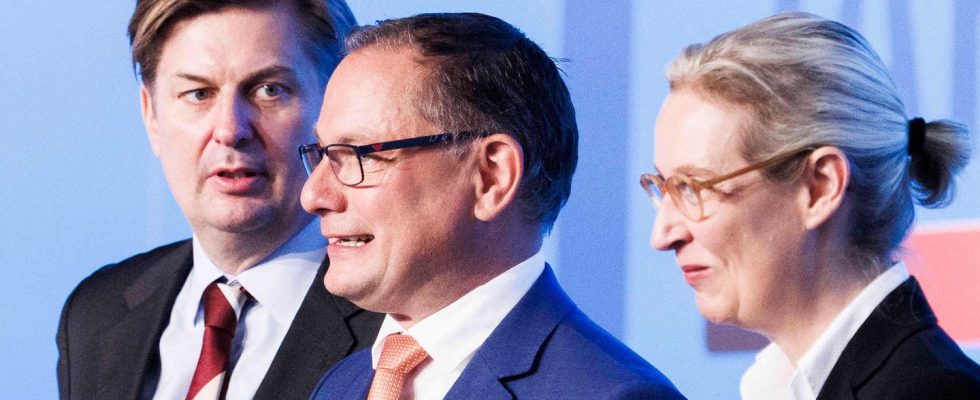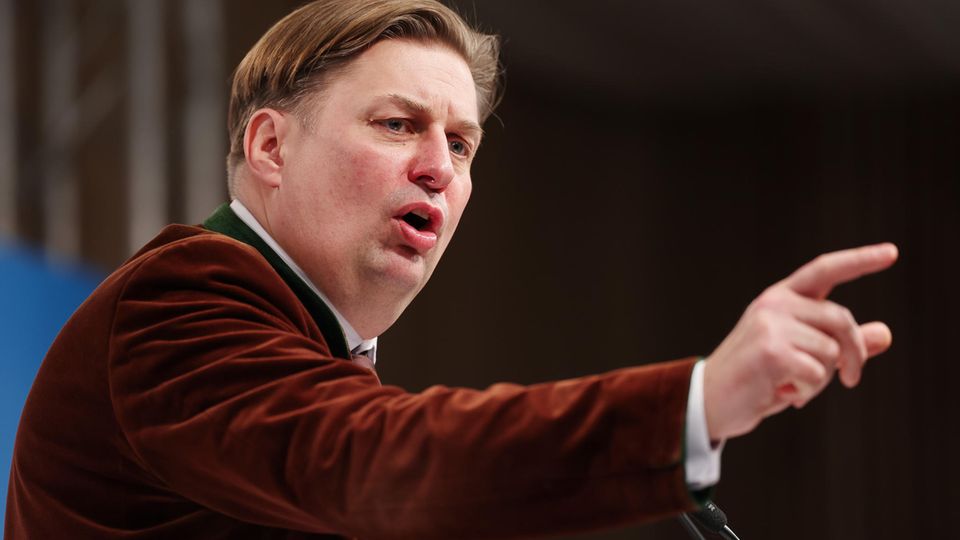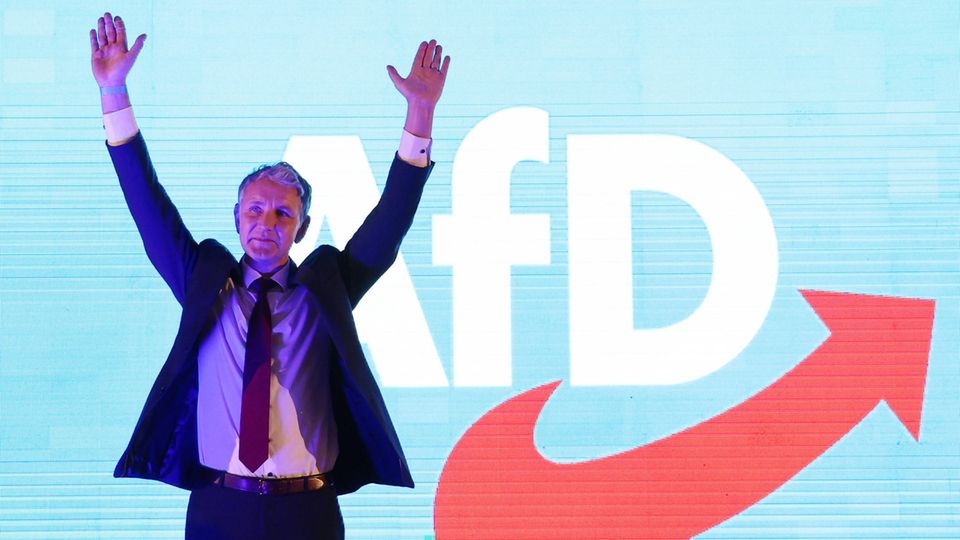On May 1st, the AfD will appear again with its affair-plagued EU top candidate Maximilian Krah. But this is just the latest curve in the party leadership’s compromise line, which is intended to prevent worse things from happening.
The windows of the office in the Jakob-Kaiser-Haus reach to the floor and offer a magnificent view of the parliamentary power of the republic. The eastern side of the Reichstag building can be seen in its entirety, including the dome, flag and Chancellor parking lot. The blue capital city sky, dotted with white clouds, arches above it.
“Nice view, right?” says Tino Chrupalla. “The best in the house!” The chairman of the AfD parliamentary group, who also leads the party, smiles proudly and falls into a chair in a decidedly relaxed manner. His facial expressions ask rhetorically: Is something wrong?
Yes, it’s something: the AfD’s European election campaign is currently imploding in slow motion. First it became known that the top election candidate Maximilian Krah and his number 2, Petr Bystron, had given interviews to an Internet platform that financed people from the Vladimir Putin universe. Information from the Czech secret service was then reported that Bystron was said to have received 20,000 euros via the same platform. And finally, the Federal Public Prosecutor’s Office had one of Krah’s employees arrested. The suspicion: espionage for China.
All of this makes the AfD noticeably nervous. Because even before the chain of affairs, the party had already passed its peak in the polls. After the large demonstrations against right-wing extremism showed that the AfD is far from owning the streets, the Sahra Wagenknecht alliance emerged as a left-wing national populist rival party, which partly occupies AfD positions on the issues of migration, the Ukraine war and the aftermath of Corona. In addition to all of this, there are now suspicions of treason and venality right before the European and local elections.
The problem of Tino Chrupalla
The AfD is now only between 15 and 17 percent in the federal government, and in the state electoral state of Thuringia it has slipped below 30 percent. And even if the party leadership feels secure with its core voters, there is still growing fear of relegation to the second league, without dreams of becoming prime minister and chancellor.
When asked about the surveys, Chrupalla looks a little more serious in his office. “This is doing us harm, especially in public,” he says, but immediately adds: “Nevertheless, the party presents an image of unity.”
His problem is: he doesn’t know what will happen next. Despite all the evidence, the allegations against Bystron have not been proven and Krah is not yet being investigated. But it is noticeable that Chrupalla and his co-chair Alice Weidel have this time built a reassurance clause into the usual victim rhetoric. Yes, the board of course believes Krah and Bystron’s denials, it was said in ever new versions – but only as long as there was no evidence to the contrary. In the event of the transfer, sanctions were threatened in a press release: “Any influence by foreign states through espionage, but also attempts to buy opinions and positions, must be investigated and strictly prevented.”
In addition, Krah and Bystron were not allowed to appear at the start of the EU election campaign in Donaueschingen last Saturday. “Today it shouldn’t be about Krah, Krah, Krah, but about the AfD”Chrupalla shouted there to complain eloquently about the “torn fire” that was supposed to “destroy the party”. Chrupalla also claims in his office that the investigation raises many questions. The most important one is: “Why was the employee only arrested now, even though there had apparently been suspicions for a long time?”
The Thuringian AfD state leader Björn Höcke at a state party conference in Pfiffelbach at the end of April.
© Karina Hessland / Imago Images
Chrupalla meanders in such a way because under his and Weidel’s responsibility, Krah and Bystron were elected to the top of the EU list in Magdeburg in the summer of 2023. Although plenty of verifiable information about obscure relationships with Russia and China was already circulating back then, the party leadership gave in to pressure from the network around parliamentary group deputy Sebastian Münzenmaier, who had allied himself with the former wing around Björn Höcke, the Junge Alternative and other extremists in the party.
This pact now results in a rather winding line of compromise that continues this May 1st, when Krah is allowed to perform in his hometown of Dresden at the so-called Spring Festival and the Saxon Chrupalla joins him. The gesture is intended to calm the hardliners, whose fighting position was again set by the so-called New Right thinker Götz Kubitschek: The “forced-financed media” and others wanted to specifically dismantle Krah a few weeks before the European elections. And: “This dismantling should be carried out by the AfD itself.”
In fact, the renegades within the party feel emboldened. While a group in the Bundestag led by MP Norbert Kleinwächter is exploring secession plans, some outgoing MEPs are expressing themselves with maximum openness. This is what Nicolaus called Fest in an internet video the AfD as an “unpatriotic, semi-socialist clan group that acts as Moscow’s fifth column and doesn’t care at all about the law and freedom.” Weidel and Chrupalla ruled with the help of “machinations”, “open violation of the law” and “crooked maneuvers”.
“A problem-proven person”
MP Sylvia Limmer, in turn, recalled on Deutschlandfunk that Krah was isolated in the right-wing populist faction and was suspended twice: “What else do you actually have to do so that the Federal Executive Board understands – and before Magdeburg – that Mr. Maximilian Krah is a person with proven problems?”
But even the renegades know that they are in the minority for now. The radical wing, which has long since emancipated itself from Höcke, clearly dominates the party. Chrupalla has always been part of it, while Weidel had to come to terms with it years ago. The following applies to both: keep your eyes closed until the federal party conference in Essen at the end of June, where you will be re-elected. The meeting location alone is warning enough: It was in Essen when the first AfD chairman Bernd Lucke was chased out of office by Höcke, among others, in the summer of 2015.
Chrupalla is counting on the disciplinary effect before the state elections in Saxony, Thuringia and Brandenburg in September. In addition, he says, his party is learning. One insight: “Candidates not only have to win majorities at party conferences, but also have the necessary competence, integrity and character suitability.” The Federal Executive Board must “actively support” this selection process.
The sentence obviously refers to Krah, but Chrupalla wants to have considered it “in general” – and has also taken the next curve in the compromise line of the AfD leadership. And the next one will definitely follow on May 1st, at Dresden’s Neumarkt, at a joint appearance with the resurrected top candidate Krah. Headline of the event: “AfD family festival”.



